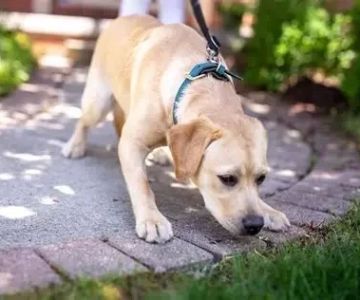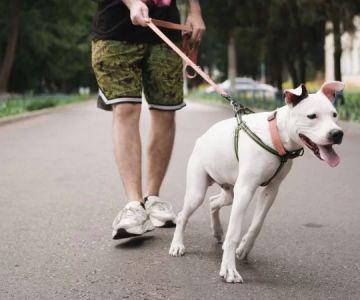How to Train a Dog to Stop Digging Holes in the Yard
As a dog owner, there are few things as frustrating as seeing your pet dig up your yard. Whether it’s your freshly planted flowers, a prized garden bed, or just a random hole in the middle of your lawn, digging can be a challenging behavior to curb. After all, dogs are naturally inclined to dig for various reasons, and understanding why they do it is key to figuring out how to stop it. Fortunately, with the right approach and training, you can teach your dog to stop digging holes in the yard. Let me share my personal experience and some practical tips that have helped me successfully address this issue with my dog.
1. Understand the Reasons Why Your Dog Digs
Before you can train your dog to stop digging, it’s essential to understand why they are doing it in the first place. Digging can occur for a variety of reasons, and pinpointing the root cause is the first step toward resolving the behavior. Here are a few common reasons why dogs dig:
- Exploration and Play: Dogs, especially puppies, are naturally curious. They might dig out of boredom or simply to explore their environment.
- Comfort and Cooling: Dogs with thick coats, especially during hot weather, may dig to create a cool spot in the ground.
- Stress or Anxiety: Dogs may dig due to separation anxiety or because they are feeling stressed or unsettled.
- Hunting or Buried Treasures: Some dogs dig because they have instinctual hunting behaviors, looking for small creatures or even food buried under the soil.
- Attention-Seeking: If a dog notices that digging gets them attention, they may continue doing it, even if the attention is negative.
Once you have a better understanding of your dog's motivation, you can tailor your approach to address their specific needs and concerns. In my case, I realized my dog was digging for comfort during warmer months, so my approach focused on managing her environment to make her more comfortable.
2. Provide Adequate Physical and Mental Stimulation
One of the most common reasons for digging is boredom. Dogs, especially those with high energy levels, need plenty of exercise and mental stimulation. If your dog is digging because they have too much pent-up energy, it's important to increase their daily activity. Here’s what worked for me:
- Daily Walks: Make sure your dog gets enough physical activity by taking them on long walks or runs. This not only tires them out physically but also provides mental stimulation.
- Interactive Toys: Invest in interactive dog toys that keep your dog engaged. Puzzle feeders, treat-dispensing toys, and chew toys are great options to keep them entertained and mentally challenged.
- Playtime: Set aside time each day to engage in play with your dog. Fetch, tug-of-war, or playing in the backyard can be great ways to keep your dog entertained and reduce boredom-driven digging.
By providing sufficient physical and mental stimulation, your dog will be less likely to dig out of boredom. Regular exercise and playtime can help your dog feel more content and less inclined to dig.
3. Create a Designated Digging Area
Sometimes, the best way to curb a dog’s digging behavior is to give them a designated space where digging is allowed. This technique can be especially effective if your dog enjoys digging as a form of play. Here’s how I implemented this in my own yard:
- Choose a Spot: Find a location in your yard where digging is acceptable. Make it a designated digging area, ideally one that is away from valuable plants or garden beds.
- Encourage Digging: If your dog starts digging in the designated area, reward them with praise and treats. Over time, your dog will learn that this is the acceptable place to dig.
- Mark the Spot: You can make the digging spot more attractive by burying some of their favorite toys or treats under the surface. This will encourage your dog to dig in the right spot.
Creating a designated digging area provides an outlet for your dog’s digging behavior, allowing them to satisfy their natural instincts without causing damage to your yard. My dog absolutely loved her designated digging spot, and over time, she learned that this was the place where digging was allowed.
4. Address Stress and Anxiety
If your dog’s digging is caused by stress, anxiety, or separation anxiety, it's important to address these emotional factors to help reduce their need to dig. When I noticed my dog digging more when I left for work, I realized that she was experiencing separation anxiety. Here’s what worked for me:
- Provide Comfort: Make sure your dog has a comfortable, safe space while you’re away. Leave their favorite toys, a comfy bed, or even an item of your clothing to provide them with some comfort.
- Desensitize Separation Anxiety: Gradually get your dog used to being alone for longer periods of time. Start by leaving them alone for a few minutes and gradually increase the duration.
- Interactive Tools: Consider using calming aids like pheromone diffusers or calming music to help ease your dog’s anxiety.
Addressing the emotional needs of your dog is key to reducing stress-related behaviors, including digging. If your dog is suffering from anxiety, working with a professional dog trainer or behaviorist can also be a valuable resource in managing the behavior.
5. Supervise and Redirect Digging Behavior
During the training process, it’s important to supervise your dog when they are outside. If you catch them digging in the wrong spot, redirect their attention immediately to something more appropriate. Here's how to do it:
- Redirect Attention: When you catch your dog digging, call their name and redirect them to a toy or an activity they enjoy. Positive reinforcement will help them learn that digging in the yard isn’t acceptable.
- Provide Alternatives: If your dog digs to find cool soil, provide them with a shaded spot or a cooling mat to rest on.
- Positive Reinforcement: When your dog behaves appropriately, always reward them with praise and treats to reinforce the behavior you want.
By supervising your dog and redirecting unwanted behaviors, you help them learn the right habits. It took some time for my dog to fully stop digging, but with consistent redirection and positive reinforcement, she gradually learned that digging was only acceptable in the designated area.
6. Use Deterrents Wisely
If your dog’s digging behavior persists, you can use natural deterrents to make the area less inviting. One method I used was sprinkling a mixture of cayenne pepper or citrus peels in areas where my dog was digging. Dogs tend to dislike the smell of citrus or spicy scents, and this can discourage them from digging. However, be careful not to use anything that could harm your dog.
Another option is to cover the digging areas with chicken wire or large rocks, making it physically harder for your dog to dig in those spots. However, be sure not to block your dog’s access to their designated digging area.
Using deterrents can help deter unwanted digging while still providing an acceptable outlet for your dog’s natural behavior. With patience and consistency, your dog can learn to stop digging in unwanted areas.
SEO Title: How to Train a Dog to Stop Digging Holes in the Yard SEO Keywords: dog digging behavior, stop dog digging, dog training, how to stop dog digging, pet behavior training SEO Description: Learn effective methods to stop your dog from digging holes in the yard. Discover tips for training your dog, creating a digging spot, and addressing anxiety.










